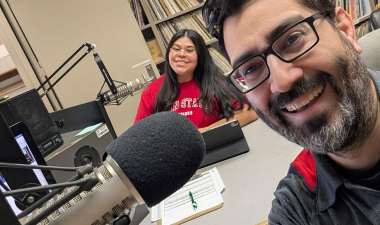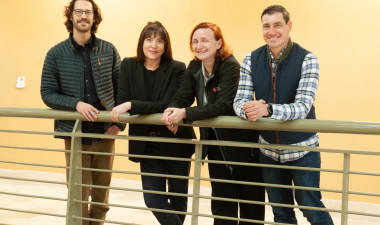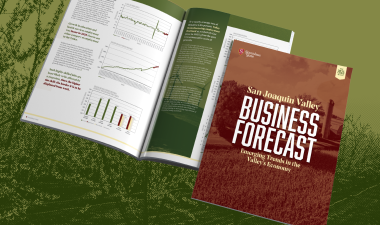When online teaching modalities became a necessity due to the pandemic, Stanislaus State faculty not only maneuvered that quick pivot, but 52 — across colleges and disciplines, including tenured, tenure-track, non-tenure track and part-time lecturers — earned certificates from the Association for College and University Educators (ACUE) for Effective Online Teaching Practices.
Endorsed by the American Council on Education, ACUE has offered certification programs for in-person teaching since 2014. With uncanny timing, ACUE was set to launch its certificate program for online teaching when the pandemic struck.
With funding from an ACUE-NASH (National Association of System Heads) grant and the California State University Office of the Chancellor, Stan State was able to make the new course for effective online teaching available in fall 2020 to two cohorts of 30 faculty members in each.
The feedback ACUE received from Stan State faculty on the two-semester program was overwhelmingly positive, with 98 percent finding the modules helpful in refining teaching practices and 96 percent saying it was relevant to their work.
They also gave high marks for lessons on assessing their learning, implementation of concepts, beliefs about teaching and beliefs about students.
Faculty enthusiasm was matched by some 200 students, whom faculty voluntarily asked to evaluate the changes they saw in their classes as a result of their teachers learning efforts.
All student responses ranked in the 90th percentile of approval: 96 percent for designing an effective course and class; 94 percent for establishing a productive classroom environment; 94 percent for using active learning techniques; 94 percent for promoting higher order thinking; and 95 percent on assessing to inform instruction and promote learning.
“These are powerful numbers,” said Faculty Center for Teaching and Learning (FECTL) Director Shradha Tibrewal, who introduced ACUE to Stan State.
She learned of it at the first Professional and Organizational Development (POD) Conference she attended as FECTL director in fall 2018, and appreciated the organization’s commitment to teaching university professors, steeped in research, how to be better teachers.
Tibrewal took ACUE ideas to former Provost Kim Greer, and the two found funding for Stan State’s first group of 30 faculty members to participate in the year-long certification for effective in-person teaching class. It began in January 2020, three months before the pandemic changed teaching for everyone.
“It’s a really ambitious program. What ACUE did was establish a framework of effective teaching rooted in research and student success.”
~Shradha Tibrewal, Director, Faculty Center for Teaching and Learning
That course continued, altered somewhat by more online teaching suggestions than might have been planned.
That group successfully completed its course in December 2020. The two cohorts learning about online teaching finished in May. Now, Stan State has space for 60 active faculty members — 30 for each cohort — to begin in late September. Information sessions are planned for Monday, Aug. 16, and Sept. 8. Whether they take courses for effective online or in-person teaching will be decided by the faculty members in each cohort.
Either program is invaluable, Tibrewal said, which is why she worked to make them available to Stan State faculty.
“We don’t have the bandwidth to create certificate programs of this magnitude and scope,” said Tibrewal, a professor who helped develop the hybrid Master of Social Work program. “It’s a really ambitious program. What ACUE did was establish a framework of effective teaching rooted in research and student success.”
ACUE’s evidence-based program uses modules that address five core principles: how to create an effective course; how to establish a good learning environment; how to create active learning; how to promote higher learning thinking; and how to assess all those elements.
Faculty become students again, charged with learning new teaching strategies in each weekly module by watching demonstrations of the techniques, followed by implementing one or more techniques in their courses and then writing reflections of the process.
Tibrewal punctuated ACUE’s schedule by holding a Zoom gathering of the cohorts every four weeks to give faculty an opportunity to pause, reflect, share ideas and feedback and raise questions or concerns. Kelly Cotter (psychology) and Karen Zandarski (English), part of the first Stan State cohort, assisted Tibrewal by serving as facilitators of those discussions with the groups that began in fall 2020.
Those meetings, faculty participants shared, were among the most meaningful aspects of the program. They provided reinforcement and support and an exchange of ideas that was lost when faculty couldn’t engage with colleagues in a hallway or when grabbing lunch.
Feedback from experienced faculty ranged from “I felt inspired and recharged” to “I learned new techniques and felt validated for what I already do in my classes” to new faculty saying, “I feel more confident,” Tibrewal shared.
That Stan State faculty embraced and excelled in ACUE certificate programs didn’t surprise Tibrewal, who began teaching at Stan State in 2000 and said she is in awe of her colleagues.
“These courses work because of their passion — who they are and what they bring to our students and our campus and to their disciplines and colleges,” Tibrewal said. “We hire incredibly amazing faculty. Our faculty are deeply caring and compassionate, and they are committed to students and to a student-centered University.”
Program and application information for the next cohort of the ACUE certificate program is available now. The application deadline has been extended to Sept. 13.



